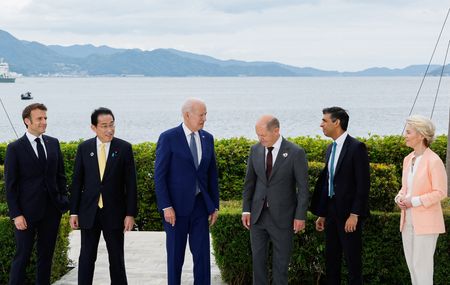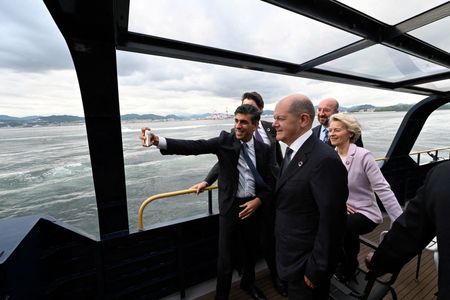 1
1 1
1


By Jeff Mason and Katya Golubkova
HIROSHIMA, Japan (Reuters) -The United States and other rich democracies said on Saturday that countries attempting to use trade as a weapon would face “consequences”, sending a strong signal to China over practices Washington has long said amount to economic bullying.
The leaders of the Group of Seven (G7) nations, meeting in the Japanese city of Hiroshima for a three-day summit, also pledged to bolster supply chains with partners, particularly for chips, batteries and minerals.
The comments from the G7, in a joint statement on “economic resilience and economic security” did not specifically mention China, although they appear to be some of the clearest yet to be directed towards Beijing over the use of trade as a political tool.
The United States and its partners are increasingly worried about the outsized role China now plays in supply chains in everything from semiconductors to critical minerals.
The Hiroshima summit comes as G7 members are faced with the immense challenges posed by Russia’s invasion of Ukraine and tensions with China.
Ukrainian President Volodymyr Zelenskiy was due to arrive in Hiroshima on Saturday, the second day of the summit, to drum up support for his country’s defence effort. His arrival in the world’s first city to be attacked with an atomic bomb comes as nuclear threats from Russian President Vladimir Putin have unsettled the West.
“We will work together to ensure that attempts to weaponize economic dependencies by forcing G7 members and our partners including small economies to comply and conform will fail and face consequences,” the leaders said in a statement.
China put pressure on Japan more than a decade ago by restricting rare earth export quotas after a territorial dispute. In recent years it pressed pressed multinationals to sever ties with Lithuania or face exclusion from the Chinese market.
That row happened after Lithuania allowed the opening of a de facto embassy by Taiwan, which China views as part of its territory.
‘COUNTERMEASURES’
China’s embassy in Britain warned the G7 countries that any words or deeds harming China’s interests would be met with “firm and resolute countermeasures”.
Yet China remains a key trade partner for the G7, meaning that even as they look to ease their exposure to China, including on advanced technologies that impact national security, they are unable to walk away from economic ties.
The G7 nations are looking to “de-risk, not decouple” from China, White House national security adviser Jake Sullivan told reporters in Hiroshima.
In a draft of the final communique seen by Reuters, G7 leaders agreed that China’s status as the world’s second-largest economy meant they had to continue to cooperate.
“We do not seek to thwart China’s economic progress and development,” the leaders said in the draft, which is subject to change.
The G7 is also taking fresh aim at Russia’s invasion of Ukraine, pledging to close loopholes that have allowed Russia to dodge sanctions by importing goods via non-G7 countries. The leaders said they had ensured that Ukraine had budget support through early 2024.
Zelenskiy is to meet separately with Japan’s prime minister and Indian Prime Minister Narendra Modi – a leader who has maintained relations with Russia’s Putin.
U.S. President Joe Biden told G7 leaders on Friday that Washington supports joint allied training programmes for Ukrainian pilots on F-16 fighter jets, in a significant endorsement for Kyiv.
The G7 is composed of the U.S., Japan, Germany, France, Britain, Italy and Canada.
(Reporting by Jeff Mason, Sakura Murakami and Trevor Hunnicutt in Hiroshima; Writing by David Dolan; Editing by Nick Macfie, William Mallard and Simon Cameron-Moore)